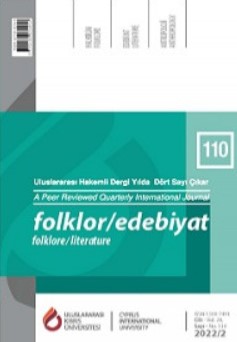Yahya Kemal’in Nazar/ Leyla Şiirleriyle E. A. Poe’nun Annabell Lee Şiirinin Karşılaştırılması
A Comparision of Yahya Kemal’s Nazar/Leyla Poem and E. A. Poe’s Annabell Lee
Author(s): Safiye AkdenizSubject(s): Comparative Study of Literature, Turkish Literature, American Literature
Published by: Uluslararası Kıbrıs Üniversitesi
Keywords: Yahya Kemal; Allan Poe; Serres Chaudes; Nazar; Annabel Lee; romanticism;
Summary/Abstract: One of the most striking features of Yahya Kemal, who is one of the most important names of Turkish literature, is that he has a synthesizing approach. Between the multicultural structure of the Ottoman geography where he was born and raised, the socio-political events he witnessed, and the personalities and intellectual and artistic movements that he was influenced by during his years in France had a great impact on his approach. After a period of search and preparation, Yahya Kemal used three basic sources while shaping his understanding of art: These are Turkish folk literature, classical literature and Western literature -which he had the opportunity to get to know closely through French literature. The artist, fed by these three sources, succeeded in creating a new and local poem by transforming existing knowledge. Yahya Kemal’s attitude distinguishes him from his contemporaries at a time when old literature is criticized or ignored with the concern of constructing the new. In this study, focus is on Yahya Kemal’s synthesizing approach using his main sources and on how Yahya Kemal carried out the transformation activity. Since both works were written in the form of a verse story, the comparison is made using the main elements of the fiction- the narrator, point of view, heroes, etc. As a result of the comparison, it was determined that the poet was inspired by the Belgian poet Maeterlinck from Western literature and was also influenced by Poe. In addition, Yahya Kemal was fed from local sources- folk literature and classical literature- while composing his text. It is concluded that the poet wrote his poem in a plain Turkish- white language-which was one of his main goals.
Journal: Folklor/Edebiyat
- Issue Year: 28/2022
- Issue No: 110
- Page Range: 371-386
- Page Count: 16
- Language: Turkish

